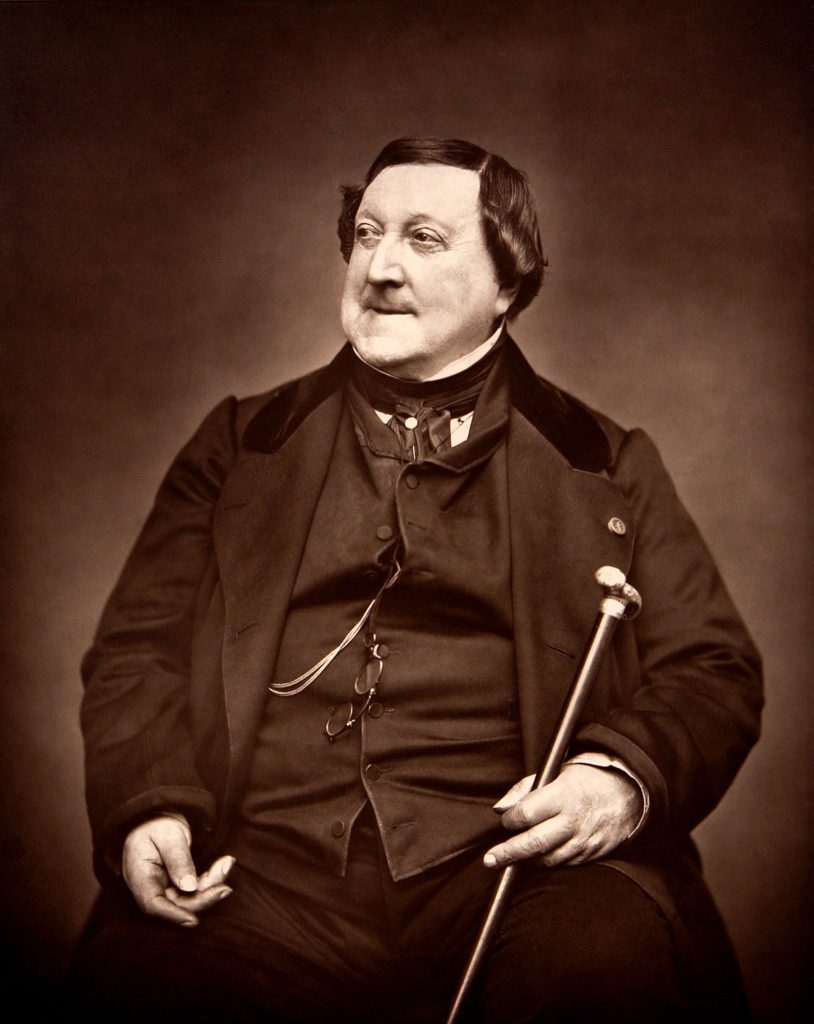
Gioachino Rossini was born on February 29, 1792, in the Italian seaport city of Pesaro, on the Adriatic Sea. He was the only child of Giuseppe Rossini (1758-1839), a professional trumpet and horn player; and Anna Rossini (1771-1827), a seamstress and later, a professional operatic soprano (hers was, indeed, quite a career change!). In 1802, when young Gioachino was ten years old, his family moved to Lugo – near Ravenna – and that’s where he received his elementary education: in Italian, Latin, arithmetic, and music.
Dude was bigly talented. In 1810, at the age of 18, he moved to Venice, where he immediately scored his first hit with his first professional opera: a one-act comedy called La cambiale di matrimonio, “The Marriage Contract.”
Over the course of the next 19 years, 38 additional operas followed: comedies and dramas, many of them masterworks that have remained in the repertoire since they were first performed.

And then, in 1829 at the age of 37, having completed William Tell (his 39th opera), Rossini upped and quit the opera biz. And even though he lived another 39 years, he never wrote another opera.
Retirement
Rossini’s retirement from the opera stage during his artistic prime has been a hot topic since it happened, accompanied with all sorts of whining, hand-wringing, and breast-beating: “why’d he do it?” “How could he do it??”
According to the poet Heinrich Heine (1797-1856), Rossini – like William Shakespeare before him – hung up his spurs when he realized that he could never improve upon the work he had already done. Others have claimed that Rossini quit out of disgust with the current trends in “Grand Opera” as exemplified in the work of Giacomo Meyerbeer and Fromental Halévy.
Writing in 1934, the English composer and music critic John Francis Toye (1883-1964) called Rossini’s retirement “The Great Renunciation,” claiming it to be:
“a phenomenon unique in the history of music and difficult to parallel in the whole history of art.”
Toye asked rhetorically:
“Is there any other artist who thus deliberately, in the very prime of life, renounced that form of artistic production which had made him famous throughout the civilized world?”
The questions regarding Rossini’s retirement – real and rhetorical – continue to be asked though not answered. Instead, we read everywhere that Rossini’s withdrawal from opera during the second half of his life:
“has never been fully explained.”
Well, okay then. Arrogant cocker that I am, 186 years removed from Rossini’s operatic retirement, I’ll be happy to explain it!…
Continue reading only on Patreon!
Become a Patron!Robert Greenberg Best Sellers
-
Mozart In Vienna
Price range: $80.00 through $150.00 -
Great Music of the 20th Century
Price range: $199.95 through $319.95 -
Understanding the Fundamentals of Music
Price range: $199.95 through $319.95 -
Music as a Mirror of History
Price range: $219.95 through $334.95 -
How to Listen to and Understand Great Music, 3rd Edition
Price range: $349.95 through $599.95





